Preparing for Profound Change | Four Key Lessons
We know profound change is coming. We feel it in our bodies. The converging crises have been named, like hurricanes brewing off shore: climate chaos, escalating militarization, economic collapse, all forms of intolerance. The early effects of these mighty storms are already being felt by many, lashing the coastlines of our lives. For others, the unthinkable has already occurred.
The Kosmos Live podcast series “Preparing for Profound Change” is a continuing effort to gather wisdom to help us cope with what lies ahead. We have turned to trusted friends for insight and guidance. How did we get here and what is happening now? What can we do to brace ourselves and our families for the impacts to come? Our featured guests offer personal practices and practical strategies in four key areas for rebuilding our world, based on the values of unity, cooperation, courage, and compassion. They demonstrate these values through their works and words.*
Embracing Collapse
Preparing for profound change requires that we first recognize and understand the converging crises we face. As Alnoor Ladha said, “Our culture is littered with warnings and cautions,” and we can no longer ignore these omens. Ladha is a founding member and Executive Director of /The Rules, a global network dedicated to changing the rules that create inequality and poverty around the world.
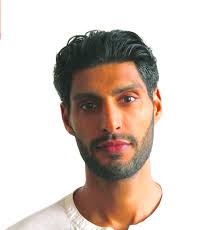 Alnoor Ladha | The first gateway decision is to bite into the fruit of the Tree of Knowledge and make some effort to understand how this system works, because we are all affected by it. Ideology is always a background condition. As soon as we say I am not political or I am not economic or I don’t have ideology, we are a part of somebody else’s ideology.
Alnoor Ladha | The first gateway decision is to bite into the fruit of the Tree of Knowledge and make some effort to understand how this system works, because we are all affected by it. Ideology is always a background condition. As soon as we say I am not political or I am not economic or I don’t have ideology, we are a part of somebody else’s ideology.
The current system is essentially anti-life. We cannot go on in this way, dependent on 3% global GDP growth, the extraction of all our resources, and taking ancient fossils from the ground to prop up a Ponzi Scheme economy. Climate change and these big challenges are rites of passage for us as a civilization. We’re being faced with stark choices.
When you start to understand what is happening, you often feel a deep sense of angst and anxiety and overburden. Managing this can become part of a spiritual practice—to be able to hold this level of ambiguity, to be able to hold the grief, to be able to understand the broader system, and to take it seriously enough to do the work but not so seriously that you are paralyzed by it.
Joe Brewer is a change strategist and evangelist for the field of culture design. He encourages us to break down our illusions of the world that keep us embedded in broken systems that we unconsciously replicate globally and generationally.
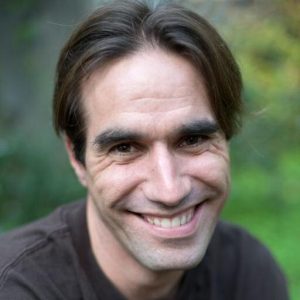 Joe Brewer | I would say that we are now in a time of consequences larger than anything our ancestors have ever known. Anyone who feels powerless or feels like their life doesn’t have meaning is not getting the message. Right now we have the opportunity to be more in power and to do things that are more meaningful than ever before in the history of humanity. The challenge is to face our fear and uncertainty in order to do what deep in our bodies we already know we need to do.
Joe Brewer | I would say that we are now in a time of consequences larger than anything our ancestors have ever known. Anyone who feels powerless or feels like their life doesn’t have meaning is not getting the message. Right now we have the opportunity to be more in power and to do things that are more meaningful than ever before in the history of humanity. The challenge is to face our fear and uncertainty in order to do what deep in our bodies we already know we need to do.
Collapse doesn’t happen in 10 to 15 minutes of violent outbreak in a movie scene. Collapse happens across decades to hundreds of years. The Roman Empire took about 300 years to collapse. Collapse is already happening and is inevitable. There are elements of collapse that are necessary and good for the future. Those of us who want to be designers of change in this time have to develop the capacity to be in that paradox.
Healing Trauma
The process of healing requires that we all learn effective ways to manage conflict and differences. Profound change is often traumatic. As leading experts in conflict resolution, William Ury and Mark Gerzon shared insights into how we can mediate conflict and heal trauma on personal, local, and global scales. They help us reframe mediation as both civic service and spiritual practice.
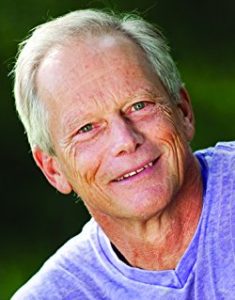
Mark Gerzon | Collective and historic traumas—originating from war, poverty, genocide, slavery—manifest in our everyday lives and our immediate communities. It is in the individual struggles and the interpersonal conflicts where our work begins. In understanding our own place in historical oppression and planetary destruction, we begin to heal ourselves and support a means to collectively envision a path forward. This healing paves the way for regenerating hope, redesigning values, and ultimately, rebuilding a sustainable society.
Oppression, discrimination, and injustice continue to plague marginalized groups in a very practical way every day. We have to identify the structural issues that are in the way of mutual understanding. As policy begins to reflect collective values, so too must our actions. By creating the conditions for open dialogue and mediation, we allow ourselves to understand how we interpret values like justice, equality, and compassion, and begin to understand where the dissonance in executing these values arises.
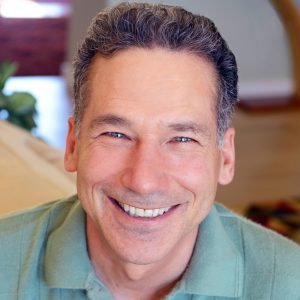 William Ury | You can’t change the past. What can change is how we hold the past, how we view the past, how we feel the past. That’s where forgiveness and compassion come in. Deep, deep, deep listening is key. We are designed, we are crafted, for cooperation. That’s how we survive. That’s how we spread around the planet. All of our conflicts, all of our issues, are made by human beings, which means that they can be solved by human beings.
William Ury | You can’t change the past. What can change is how we hold the past, how we view the past, how we feel the past. That’s where forgiveness and compassion come in. Deep, deep, deep listening is key. We are designed, we are crafted, for cooperation. That’s how we survive. That’s how we spread around the planet. All of our conflicts, all of our issues, are made by human beings, which means that they can be solved by human beings.
An old Tibetan prophecy, the Shambhala Prophecy, says there will come a moment when the Earth itself is in danger and at that moment, a new breed of warriors will come into being. I would call them healing warriors; they call them Shambhala warriors. They’re endowed with two weapons. The first one is insight, the ability to look inside. That’s where self-forgiveness comes from. The second is compassion. It’s those two valuable tools that are key right now if we’re going to begin to heal ourselves, heal our communities, and heal our planet.
Building Communities
As we learn to face reality and heal the wounds of our collective trauma, the true work of community-building begins. If one single theme emerged in the podcast series so far, it is the need for ‘beloved community’ at this time. Judy Wicks is an international leader and speaker in the local living economies movement.
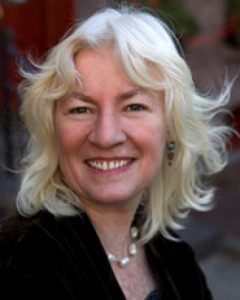 Judy Wicks | We don’t know exactly what is coming, but we do know that we will always need food and we will always need energy. The more that we can build up our local self-reliance and basic needs, the safer we’ll be in an unknown future. I think the number one thing that people can do is to buy local food and locally produced renewable energy. In building local self-reliance, we get to know our community better.
Judy Wicks | We don’t know exactly what is coming, but we do know that we will always need food and we will always need energy. The more that we can build up our local self-reliance and basic needs, the safer we’ll be in an unknown future. I think the number one thing that people can do is to buy local food and locally produced renewable energy. In building local self-reliance, we get to know our community better.
As Americans, we take great pride in being strong individualistic people that can do it on our own. We have to change that mindset to ‘we’ so that we really look at our communities, we make decisions for the good of the whole, and are willing to protect what we love—to stand up.
I think that the coming years are going to bring more and more opportunity and necessity for civil disobedience. People who have never been on a march before—or haven’t been on a march since the Vietnam War—need to get out into the streets, to make their voices heard. I think it’s clear that this is really a struggle for life on Earth.
Ma’ikwe Ludwig, a longtime advocate of cooperative culture and locally self-determined solutions to climate disruption, serves on the Board of Directors of the Fellowship for Intentional Community. Being ‘in community’ doesn’t mean we need to join an ecovillage or leave the place where we live—rather, that we redefine what community means to us and that we get involved.
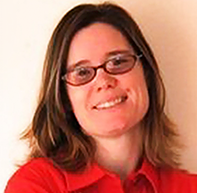 Ma’ikwe Ludwig | We need to support and join the Solidarity Movement—Black Lives Matter, Standing Rock, the New Economy Coalition—and really recognize that the racial and economic work that needs to be done right now is essential. If that means that we, as white people, and people with a certain amount of economic privilege, deliberately step back and make space for those other voices, that is what we need to do.
Ma’ikwe Ludwig | We need to support and join the Solidarity Movement—Black Lives Matter, Standing Rock, the New Economy Coalition—and really recognize that the racial and economic work that needs to be done right now is essential. If that means that we, as white people, and people with a certain amount of economic privilege, deliberately step back and make space for those other voices, that is what we need to do.
After looking at a lot of data, my best estimate is that about 10% of the consumption of average Americans is sustainable. I lived at an intentional community for eight years. It’s really not that different. What’s different is that the water that I was using was caught off of roofs. A lot of the food that I was eating was grown right on the property. The energy that I was using was from solar and wind. My kid was being educated by other people in the village.
Personal Transformation
Ultimately, regardless of our spiritual beliefs, we need a strong personal practice to carry us across the waters of profound change. Llewellyn Vaughan-Lee is a Sufi teacher. The focus of his writing and teaching has been on spiritual responsibility in our present time of transition and the emerging global consciousness of Oneness.
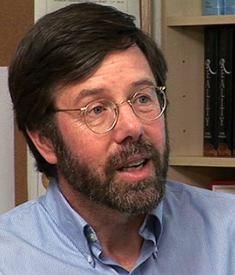 Llewelyn Vaughan-Lee | We are living in very toxic times. It requires extra special vigilance, attentiveness, and mindfulness to stay true to one’s own deepest purpose in this minefield of exploitation, in this minefield of greed. Sadly, even a lot of spirituality has become polluted by profit and loss, by commercialism. I think it’s important to have a practice of prayer or meditation that reconnects you with the sacred within yourself, with that part of you that can never be polluted, that cannot be desecrated, your own divine core, your own divine center, that sacred being within yourself that the Sufis talk about being in ‘the heart of hearts.’
Llewelyn Vaughan-Lee | We are living in very toxic times. It requires extra special vigilance, attentiveness, and mindfulness to stay true to one’s own deepest purpose in this minefield of exploitation, in this minefield of greed. Sadly, even a lot of spirituality has become polluted by profit and loss, by commercialism. I think it’s important to have a practice of prayer or meditation that reconnects you with the sacred within yourself, with that part of you that can never be polluted, that cannot be desecrated, your own divine core, your own divine center, that sacred being within yourself that the Sufis talk about being in ‘the heart of hearts.’
How can humanity and the Earth continue to evolve together? How will the Earth survive as a sacred living being, and how can we help it transform? This is a time of crisis but also a time of opportunity if we are prepared to renew our ancient pledge, our sacred commitment to the Earth to care for and protect her, to love her.
Biologist and philosopher Andreas Weber is working to reevaluate our understanding of the biosphere as a meaning-creating and poetic reality. He explores ecology as a tender practice of forging relationships, yearning for connections, and expressing these desires through our bodies. He is known for his innovative work in enlivenment and the ‘heart’ of science.
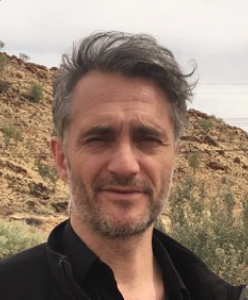
Andreas Weber | We have a fundamental deep interdependency in every relationship. We need to consider that we can be ourselves only through making the other flourish. This is an ecological fact and a paradox. Our western society at the moment doesn’t believe in this paradox.
A self can only be if it opens up to another totally. To my eyes, this means we can walk into love as something that is happening as a practice of sharing life between beings, resulting in mutual transformation. That’s actually ecology from a different perspective. We can implement this ecology of love in all our relationships. We have completely forgotten that to be in this world in a fertile and fruitful manner means to be a loving partner of others.
Dr. Deepak Chopra is a world-renowned pioneer in mind-body medicine and personal transformation, and is Board Certified in Internal Medicine, Endocrinology, and Metabolism. He is a Fellow of the American College of Physicians and a member of the American Association of Clinical Endocrinologists.
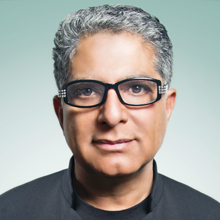 Deepak Chopra | We have to decide whether we evolve to the next stage of human evolution, through conscious evolution. Unless we consciously embark on our evolution, we are not going to make the right choice at the fork in the road. It’s very urgent that we make the right choice.
Deepak Chopra | We have to decide whether we evolve to the next stage of human evolution, through conscious evolution. Unless we consciously embark on our evolution, we are not going to make the right choice at the fork in the road. It’s very urgent that we make the right choice.
There has to be a very big collective effort to understand the nature of reality. Right now, that which we call the universe is a human construct. Body/mind/universe are all human constructs. There is only consciousness modifying itself into sensations, images, feelings, perceptions, and thoughts. To awaken to that is actually the meaning of complete freedom. Collective reality can only be changed when enough people awaken to the fundamental ground of all existence.
Science is way behind. Most scientists think that their science is a methodology for knowing the truth, but science is just a system of thought like philosophy or theology or religion. Systems of thought, even scientific systems of thought, have no privileged position to knowing the truth. No system of thought can get us there. Only transcendence and inquiry, very direct inquiry, into the nature of consciousness can get us there.
Kosmos Journal would like to offer deep thanks to our colleagues for participating in the podcasts. “Preparing for Profound Change” is hosted by Kosmos digital editor Rhonda Fabian. It explores the realities of the shifting global landscape and offers strategies for coping with what lies ahead. You can find all the programs here, and also on iTunes.
*Podcast quotes by our colleagues have been edited by Kosmos for ease of reading.

I feel grateful for this meaningful contribution from Kosmos Journal to throw light on our current times.
I do not know whether we are in the middle of a crucial period for Humanity, but does this really matter regarding my necessary commitment towards a world of higher harmony, consciousness and spiritual and embodied collective intelligence?
The bulk of my responsibility lies in my personal serenity, joy and peace that I can diffuse to others, to the world and all living beings, including the generations to come.
Understanding before acting seems to me like a loss of time, a luxury and even an ego and illusionary endeavour. And it is so boring.
Ms. Ludwig, one of the featured guests profiled above, wrote “We need to support and join the Solidarity Movement—Black Lives Matter, Standing Rock, the New Economy Coalition—and really recognize that the racial and economic work that needs to be done right now is essential. If that means that we, as white people, and people with a certain amount of economic privilege, deliberately step back and make space for those other voices, that is what we need to do.” So where are those other voices in your podcast series? Why is there not space made for them here? How can we hope to understand transformation without the wisdom of Black women and men? And of other people of color? I’m eagerly awaiting the day when white experts who are approached to participate in forums such as this one decline the offer unless people of color are in the forefront. How else will we dismantle the system of white supremacy that is reinforced even in the most progressive spaces?
Dear Phyllis, I’m so glad we have been able to communicate about this via email and I’m excited about the prospect of collaborating in the near future. We agree completely with what you say. Thank you!
To reiterate – Our Kosmos family includes wonderful Black voices but we were not able to fit schedules this time around which I deeply regret! So, in fact we have a next series planned to address precisely that. I’m seeking a host or co-host (with several in mind) and welcome suggestions (and for guests too).
Our planned theme: New Story and Race.
Rhonda your reply was so gracious and I too am eager to explore how we might collaborate. It’s crucial for people engaged in social justice work to support and connect with each other. Thank you for hearing my thoughts and receiving my feelings, for responding with humility rather than defensiveness! These are the qualities and virtues that will allow us to transform our systems.